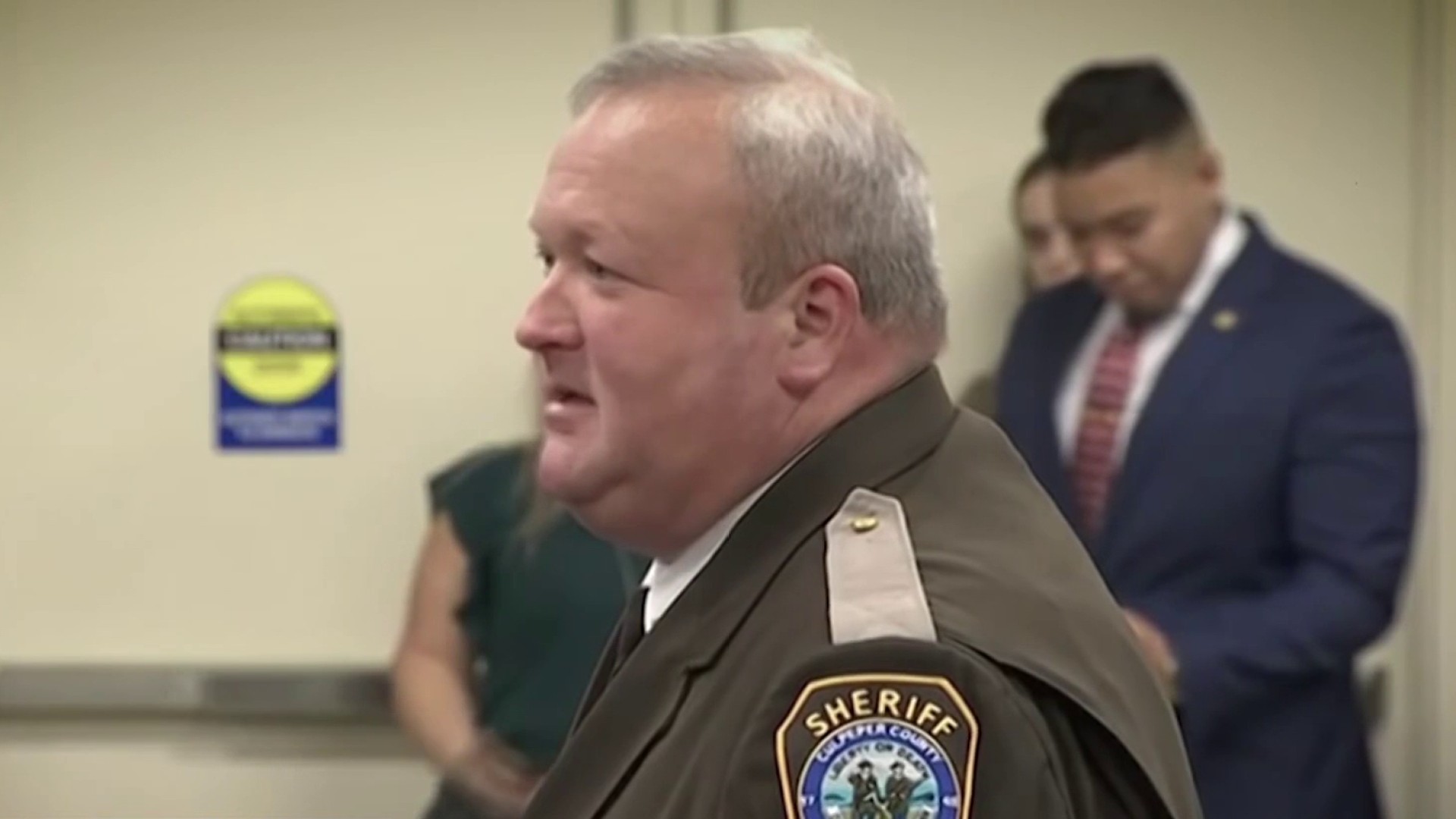Former Culpeper County Sheriff Scott Jenkins was convicted of all 12 conspiracy, fraud and bribery charges against him in federal court Wednesday, in a corruption case that upended the rural Virginia leader's career.
At the end of the weeklong trial in Charlottesville, prosecutors described the evidence against Jenkins as “abundant and devastating.” Jurors appeared to agree, taking less than two-and-a-half hours to find him guilty on every count.
The former sheriff sat stoically as the verdict was read, his family sitting behind him.
Federal prosecutors said Jenkins took more than $75,000 in bribes from people he made auxiliary deputies, claiming their badges would allow them to carry concealed weapons in all 50 states. Donors said they also wanted the badges to help them get out of speeding tickets. Jenkins’ defense said the funds were legal campaign contributions and a “provocative” and “creative response” to defending gun rights by building up the auxiliary program.
We've got the news you need to know to start your day. Sign up for the First & 4Most morning newsletter — delivered to your inbox daily. Sign up here.
Jenkins, who pleaded not guilty, could face significant jail time, according to prosecutors.
The testimony heard at trial confirmed many of the allegations against Jenkins the News4 I-Team has reported for almost two years. The I-Team learned in April 2023 that the FBI seized $10,000 from Jenkins’ campaign account that January, amidst signs of a larger investigation. Jenkins was indicted nearly a year-and-a-half later.
While prosecutors argued to have Jenkins taken into custody, the judge allowed him to remain on bond until sentencing. Jenkins left the courthouse with his family and didn’t address the verdict.
“We’re disappointed in the verdict and we intend to keep fighting,” defense attorney Phil Andonian told the I-Team.
The I-Team asked if Jenkins’ team would seek an appeal or pardon.
“I don’t know. We’re considering all of our options,” Andonian said.
The case against Jenkins
Jenkins first attracted national attention in late 2019, as the Virginia General Assembly considered changes to the commonwealth’s gun laws. At the time, Jenkins repeatedly said he would deputize thousands of auxiliary deputies to circumvent any possible new Virginia firearms restrictions.
Jenkins ran the Culpeper County Sheriff’s Office from 2012 to 2023. Federal prosecutors said for many of those years, he gave auxiliary deputy badges to people who paid him thousands of dollars in checks and cash. Prosecutors said some of the money was deposited in Jenkins’ campaign accounts, while much of it was deposited directly into his personal accounts.
Court records filed in final preparation for the trial alleged “the origins of the bribery scheme” went back to 2011, when Jenkins was first running for office. A donor to that campaign gave $5,000 and was later sworn in as auxiliary deputy in 2012, according to records. Jenkins was not charged with any crime connected to that payment, but the same court records alleged Jenkins and that donor worked since 2015 to find other “wealthy Northern Virginia businessmen who wanted to be sworn as auxiliary deputies in exchange for campaign contributions.”
“Scott Jenkins used his position as sheriff to line his pockets and benefit himself. You will hear the same story again and again. Instead of serving people, the only people he chose to serve was himself,” a prosecutor told the jury at the trial's start.
Three co-defendants pleaded guilty to paying bribes to Jenkins.
Kevin Rychlik told jurors he was a trusted aide to Jenkins for almost a decade. He said he turned the FBI onto Jenkins’ alleged scheme and went on to record hours of conversations between himself and Jenkins.
Rychlik testified that in 2011 he gave Jenkins a $5,000 donation and got an auxiliary deputy badge in return, giving him the same rights as a sworn deputy.
Rychlik said he ended up becoming a key campaign fundraiser for Jenkins, recruiting Rick Rahim to donate to Jenkins and calling him a “big fish” in text messages the jury saw. There were others, including Fred Gumbinner, Rychlik testified, with Rychlik telling jurors he was usually there himself when money and badges changed hands.
Prosecutors say when the IRS came knocking on Rychlik’s door in 2019, asking about millions in taxes Rychlik hadn’t paid on his businesses, Rychlik turned on his longtime friend. He told the FBI Jenkins was “taking money for bribes for credentials.”
The FBI turned Rychlik into an informant and set him up to record meeting after meeting between himself and Jenkins.
Prosecutors say a recording captured Jenkins speaking to Rychlik about Rahim, a convicted felon who pleaded guilty to bribing Jenkins and in return getting a badge and restored firearm rights.
“You got a felony record, you got a clean record and can carry a firearm, and we followed it up by swearing you in. Name another sheriff in the State of Virginia that would do that,” Jenkins said in the recordings presented by prosecutors.
On cross-examination, Jenkins’ defense worked to discredit Rychlik, reminding jurors he was the person who brought the donors, including two undercover FBI agents, to Jenkins and that Rychlik’s tax problems could be helped by his cooperation in the case.
‘It’s perfectly OK’: What Jenkins testified in his defense
Jenkins’ defense lawyers said his actions were a “provocative” defense of Second Amendment rights. They said donors “supported his idea with time, their service. They supported it with their money,” a lawyer said. “They gave and they gave big.”
An online fundraiser for Jenkins compares him to President-elect Donald Trump and includes a post by one of his attorneys saying, “Sheriff Scott Jenkins is under attack from the Biden DOJ and needs your help.” It’s raised just over $9,000 to date.
Jenkins himself took the stand Tuesday and explained to the jury why he says he’s innocent. It marked the first time we heard Jenkins respond to the allegations.
In a Charlottesville courtroom packed with Jenkins’ relatives, the former sheriff told jurors he did not take bribes; instead, he said the money was funding for a political campaign.
“Accepting donations for your campaign is perfectly OK,” he said.

Jenkins’ defense lawyers have maintained throughout the trial that Jenkins was worried about building what he called his campaign war chest. They said the alleged-bribes-for-badges scheme was not what it seemed.
“I understand in hindsight how it appears,” Jenkins told the jury.
He later said the repeated lunches and money for provided badge captured on FBI undercover cameras were nothing more than political glad-handing,
“If you’re an elected official with a brain, you’d try to meet them,” he said.
“It looks like something it isn’t,” he added. "It’s perfectly OK.”
On cross-examination, Jenkins told the jury he had the authority to appoint anyone he saw fit as an auxiliary deputy. He said auxiliary deputy ordinances in Culpeper didn’t apply to him as an elected constitutional sheriff. He said he never read his own general order on the auxiliary deputy program.
Jenkins seemed frustrated under cross-examination and told prosecutors there were several questions he couldn’t answer or didn’t understand. He questioned whether texts found on his phone in government searches were actually his.
“I took an oath to tell the whole truth,” he said. “[…] You’re tearing me apart over the least little things […] you don’t understand.”
Verdict follows years of I-Team reporting on Jenkins
The News4 I-Team first learned of the investigation into then-sheriff Jenkins in April 2023, when the FBI filed a notice it had seized $10,000 from Jenkins’ campaign account on Jan. 31, 2023. A few weeks earlier, the I-Team learned several Culpeper County employees had been subpoenaed to offer testimony to a federal grand jury.
The I-Team learned of a large number of auxiliary deputies appointed by Jenkins. In searches of Culpeper County court records, the I-Team found 46 auxiliary deputies appointed by Jenkins and sworn in by a circuit court judge. That is more than double the number of auxiliary deputies authorized by a Culpeper County ordinance that says auxiliary deputies are “not to exceed fifteen (15) percent of the paid force.”
The program seemed to violate state law and county ordinance. The I-Team raised those questions in April 2023. Jenkins never responded until he testified Tuesday, saying those rules and laws didn’t apply to him.
The number of deputies is far from the only question the I-Team had about the program. According to the sheriff’s general order, auxiliary deputies are supposed to be trained. According to the results of a Virginia Freedom of Information Act request, the Virginia Department of Criminal Justice Services only had training records for three of the 46 auxiliaries. There was no evidence background checks were conducted. Rahim, one of the auxiliary deputies, had felony convictions in his past. In court, Jenkins said he never read that general order and would have redrafted it had he seen it.
Jenkins and three co-defendants were indicted on June 28, 2023. All three co-defendants later pleaded guilty.
That July, the I-Team learned one auxiliary deputy was found in Texas with a pricey assault rifle owned by the people of Culpeper County. The I-Team asked Jenkins why the man had the gun but didn’t get a response. The question of how many other county-owned guns were in Culpeper and elsewhere wasn't mentioned in the indictment and didn't come up during the trial, but the current sheriff confirmed he got guns from all over the country, including the one from Texas.
During the trial, former Culpeper County Sheriff’s Office employees testified that working under the former sheriff could be stressful, with one describing a culture of fear and bullying.
Back in 2017, the I-Team talked to former deputies who accused Jenkins of creating a hostile atmosphere for law enforcement employees. Jenkins rebutted the criticism and questioned why the deputies sought to remain anonymous, calling them disgruntled ex-employees and politically motivated. Agency records obtained under the Freedom of Information Act confirmed staff resignations, terminations and retirements in sheriff’s office far outpaced those in other local sheriff’s departments.
In 2019, the I-Team reported a charity operated by the sheriff’s office potentially violated federal tax rules by helping support the sheriff’s re-election campaign with campaign signs posted at an annual Halloween event, according to a two-year investigation by the I-Team.
The sheriff’s office also drew scrutiny from citizens and a taxpayer watchdog group for using county jail inmates to work at the home of the sheriff’s brother to support one of the charity’s fundraisers.
At the time, a spokesperson for the then-sheriff said there was nothing inappropriate happening.
After Wednesday’s verdict, Jenkins is scheduled to be sentenced March 31.
News4 sends breaking news stories by email. Go here to sign up to get breaking news alerts in your inbox.




